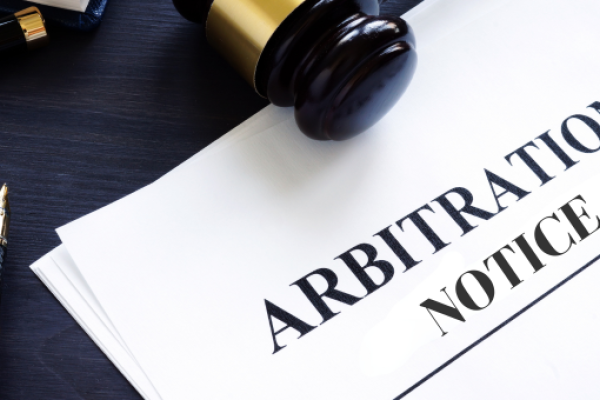
Mia Antonopoulou
Published: January 18, 2024
Sino Channel Asia Ltd v Dana Shipping & Trading PTE Singapore and another [2017] EWCA Civ 1703
Factual Background
Mr Jung, the owner of Sino Channel Asia Ltd (“Sino”), agreed with Mr Zhou, the owner of Beijing XCity (“BX”), that Sino would provide BX with letters of credit of financial services, whereby BX would arrange back-to-back sale and purchase contracts concluded in the name of Sino Channel. Mr Zhou delegated the operational side of the above transaction to his employee, Mr Cai.
By a contract of affreightment, entered into between Sino and Dana Shipping & Trading Pte Singapore (“Dana”), Dana agreed to carry around 275,000mts of iron ore from Venezuela to China. The contract of affreightment was negotiated by brokers Lynx for Dana and Triton for Sino, but was signed by Mr Jung. All day-to-day operational matters were handled by Mr Cai. The contract of affreightment provided for arbitration in London.
When disputes arose under the contract of affreightment, Dana served a notice of arbitration on Mr Cai via brokers. In the absence of a response from Mr Cai, an award was issued in favour of Dana, which was thereafter served on Sino at its registered address in Hong Kong. When Dana sought to enforce the award in Hong Kong, Sino applied for a declaration and order under section 72(1) of the Arbitration Act 1996 thar the tribunal had not been properly constituted, in that Mr Cai had not been authorised to receive service of the arbitration notice.
The High Court agreed. Dana appealed to the Court of Appeal. The issues for decision by the Court of Appeal were:
- Did Mr Cai and BX have implied actual authority to receive the notice of arbitration?
- Did Mr Cai and BX have ostensible authority to receive the notice of arbitration on behalf of Sino?
- If the answer to either of these questions was “no”, had Sino ratified BX’s receipt of the notice of arbitration?
The Court of Appeal Judgement
The Court of Appeal allowed the appeal on both issues of authority but based on the very unusual facts of the case. Therefore, the arbitration award was enforceable against Sino.
Implied Actual Authority
In the case of implied authority the focus should be on the “actual circumstances” of the relationship between the principal and the agent; on what may be inferred from the conduct of the parties, i.e. from the relationship between Sino and BX. In this case, the relationship between the two was “striking” and “remarkable”. Sino had played no part in the negotiation or performance of the contract of affreightment, and had not imposed any conditions in respect thereof. It was held, therefore, that “Sino was apparently content with complete passivity – a situation aptly described as a complete delegation, where it might be faced with unanswerable and substantial liability by reason of BX’s breach/es of contract”.
In support to this conclusion, reference was made to the facts leading up to the assumption that Mr Cai was a representative of Sino, including the position followed by Triton, Sino’s brokers, who served the notice of arbitration on BX and not Sino.
This was to be contrasted with the wide general authority that a P&I Club and/or solicitors have on behalf of a member or client – that authority does not, however, translate into authority to accept service of proceedings.
Ostensible Authority
On the second issue, it was held that although actual and ostensible authority are very different, in that the latter pertains to the authority of an agent as it appears to others, the present case was an example where actual and ostensible authority coincided. The rationale behind this was that the relationship between Sino and BX was “most unusual”, in that BX/ Mr Cai enjoyed “carte blanche”, forming the foundation of how BX/ Mr Cai appeared to others. In turn, this had led Dana to believe that BX/ Mr Cai would be dealt with for “all purposes”, including service of the notice of arbitration.
Glencore Agriculture B.V. v Conqueror Holdings Limited [2017] EWHC 2893
Factual Background
Disputes arose under a charterparty. Glencore had chartered the “Amity” from Conqueror Holding limited for the carriage of corn from Ukraine to Egypt. The charterparty provided for arbitration in London with each party to appoint an arbitrator in the event of a dispute.
There were delays at the load port. The vessel had arrived at Ilychevsk on 30 January 2015 but remained at anchorage up until 8 February 2015 following instructions by a Mr Oosterman of Glencore sent from a personal email address. Owners claimed damages for detention at the agreed daily demurrage rate for the time spent at the anchorage.
All correspondence pertaining to Owners’ claim, including the notice of arbitration was addressed to Mr Oosterman’s email address. In the absence of any response Owners obtained an arbitration award ordering Charterers to pay the claimed damages. Charterers only became aware of the arbitration when they received the award by post in late October 2016
Charterers applied to the High Court under section 72 of the Arbitration Act 1996 to set the award aside, on the ground that the notice of arbitration and notice under section 17 of the Act (Power in Case of Default to Appoint a Sole Arbitrator) were not validly served by being sent to the email address of a ‘relatively junior employee’.
The High Court Judgement
The issues before the court were whether the notice of arbitration had been validly served and if on ordinary agency principles Mr Oosterman had the authority to receive the arbitration notice.
On the first issue, section 76 of the Arbitration Act 1996 provides that the parties are at liberty to decide the manner of service of any notice; if no such agreement is reached, service by “any effective means” should suffice. As a result, it was held that service of a notice of arbitration via email should fall well within the ambit of “any effective means” albeit, it should be noted that sending notice of arbitration to a generic email address is unlikely to amount to good service unless that address was that organisations only email address.
On the second issue, the question was whether the acts of an employee bind the company. It was held that “whether a company is bound by notification to an employee should depend upon the authority which the company has granted to that employee to receive the notification (actual authority, express or implied); or is estopped from denying because of what it had represented to the third party about the employee’s authority to receive the notification (ostensible authority)”.
Therefore, validity of service of the notice of arbitration would depend on whether Mr Oosterman had authority to accept service and what role he had within the company. In determining this question, Popplewell J made a distinction between individual and generic email addresses. A distinction was also made in respect of an employee’s role within the company to handle operational or commercial issues in contrast to an authority to accept notices of arbitration and engage in the resolution of disputes. On the facts, it was found that Mr Oosterman was a junior employee of the company, and could not, therefore, have had either actual or ostensible authority to accept a notice of arbitration.
Comments
Both decisions serve as a reminder that great caution must be exercised when serving notice of arbitration to ensure that the correct contractual counterparty is served at the correct address, as well as to ensure both (i) if service is on a particular individual that individual has authority, and (ii) that any contractual service requirements are complied with. Failure to do so can result in significant wasted costs an otherwise valid claim being time barred, or even if still in time ultimately an inability to make a recovery if a respondent has ceased business / no longer has assets.
As to (i) above, it should be noted that ‘even where an employee or agent has a wide general authority to act on behalf of his employer/principal, such authority does not (without more) generally include an authority to accept service of a notice of arbitration’ (Eder J in Sino Channel, and on the very particular facts in Sino Channel did not assist Sino Channel e.g. the relationship between the Sino and BX was “striking” and “remarkable”).
On a final note, Members may wish to consider incorporating in their contracts the LMAA arbitration notice clause, where each party is required to specify at least one individual and one general email address. Alternatively, and in cases of doubt, it is advisable to also serve a notice of arbitration in accordance with section 76(4) of the Arbitration Act 1996, which provides for service at the respondent’s company’s registered address or principal business address, which should then be effective service.





